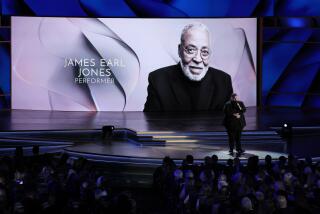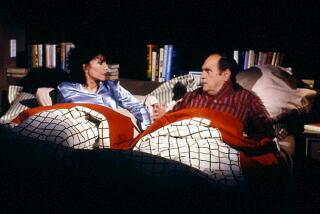‘Lonesome Dove’s’ Duvall--the ‘Real People’ Actor
- Share via
Though he walked away from the CBS miniseries “Lonesome Dove” satisfied with the finished product, actor Robert Duvall says the frustrations of working in television have led him to consider giving up acting on the small screen permanently.
Duvall--an Academy Award- winner for his performance as downtrodden country singer Mac Sledge in “Tender Mercies,” and a veteran of “To Kill a Mockingbird,” “The Godfather,” “Apocalypse Now” and the controversial 1988 film about Los Angeles street gangs, “Colors”--complained in a recent interview that “too many chiefs” in the collaborative medium of network television put the creative integrity of TV projects at greater risk than in feature films.
“There’s always some kind of conflict somewhere down the line with the networks,” Duval fretted mildly. “It’s not like the director’s in charge, like in movies and films. It (television) is too compartmentalized--there are too many chiefs, probably uneducated chiefs, I feel, in certain areas.”
Duvall said he loved his role as ex-Texas Ranger Gus McRae in “Lonesome Dove,” an eight-hour, $20-million saga of the Old West based on Larry McMurtry’s Pulitzer Prize-winning novel. “It’s a beautiful slice of American history,” Duvall said. (The miniseries begins Sunday and will air nightly from 9 to 11 p.m. through Feb. 8.)
But he didn’t love making the miniseries, in large part because of last-minute casting decisions that Duvall decries as typical of television.
“There were problems on the set, arguments about the way it was done,” Duvall said. “This is because the network says they’re deciding, deciding, deciding. And that is a roundabout way of sabotaging a project, and that’s very disconcerting.
“In a feature film this wouldn’t necessarily happen, but in network TV it does. You have people making recommendations of who’s going to be in (a project) based on the ratings, which is understandable to
a point,” he continued. “But yet, when you infiltrate all the parts with that, then to me, that gets to be why people don’t want to do television, and I would think hard before I do another one.”
Although Duvall said there were “other examples” of last-minute casting problems (which he declined to specify), his main gripe about “Lonesome Dove” was over the casting of one small but pivotal role: that of Blue Duck, a half-white, half-Native American renegade who was Gus McRae’s arch enemy during his Texas Ranger days. Blue Duck returns to terrorize Gus and the other members of the Hat Creek Cattle Co. as they journey from the dead-end Texas town of Lonesome Dove to the more fertile ground of Montana during the course of the film.
After considering a number of actors for the role, the producers gave it at the last minute to Frederic Forrest.
Duvall was displeased because a full-blooded Comanche Indian whom he had recruited to perform a screen test for the role was rejected. Duvall’s choice, who was not a professional actor, got a lesser role in the film.
“They wanted a name,” Duvall complained. “Somebody suggested Rudolf Nureyev; somebody else wanted Klaus Kinski. I mean, it was ridiculous. Now, Freddy (Forrest) did all right in the part, but Freddy was not right for the part, and he knew that. And when they brought him in, they didn’t give him a chance to prepare--the poor guy was frantic.”
Although Duvall credited producers Suzanne de Passe, Bill Wittliff and Dyson Lovell for doing battle with the network to preserve the integrity of the film, Lovell said it was he, not CBS, who made the decision to cast Forrest as Blue Duck.
Indeed, Lovell said the network maintained a hands-off posture with the producers. He said he sought in his casting choices to blend well-known TV stars with feature film actors to create “a special-event package.” The cast includes Diane Lane, Tommy Lee Jones, Danny Glover, Robert Urich, Ricky Schroder and D. B. Sweeney.
Lovell called the Nureyev idea “an absolutely grotesque suggestion from some casting person” and said his own first choice for Blue Duck was Charles Bronson, who was unavailable. Forrest, he said, was on the original list of actors considered for the part. Lovell said it was he, not the network, who believed the role cried out for a name actor.
“I was in touch with Bobby (Duvall) during the initial casting process because I valued his opinion, you know?” Lovell said. “I wanted to hear what he said. Very often, I would run it by the network and see what they said as well. He probably is not used to a producer needing to be in such close touch with the network.”
Whether control of the project rested with the network or the producers or a combination of the two, Duvall’s sensitivity to having his own casting preferences challenged underscores an attitude that he readily acknowledges: He has reached a point in his career where he wants to be in control without interference from anyone.
As an actor, Duvall completely loses himself in his characters. He refused to be photographed during this interview, for example, preferring instead to have a photo of him as Gus used, and he doesn’t mind that his varied collection of character roles have left him without anything you could call a star identity. The soft-spoken Virginia native likes being able to travel the country anonymously, observing the enigmatic rural denizens who intrigue him the most. “I’m not a big, neon-sign actor, recognizable,” he said happily.
“People ask me: ‘What’s your statement?’ I don’t have a statement,” he said. “I just want to see a character in a situation.”
But Duvall does want his creative input, if not his face, recognized in a big way. He is currently trying to sell Hollywood on the idea of backing a script he wrote for himself called “The Apostle,” about a small-town preacher. He has been lurking in the back pews of churches from the rural South to downtown Los Angeles to better understand the charisma of the leaders of the congregations. He’s been trying to sell the script for years.
Disgusted by the poor quality of films that turn up on the critics’ annual “10 Best” lists, Duvall doesn’t understand why he can’t get Hollywood to put its money behind “The Apostle.” “But then, that’s the way it is--I shouldn’t be surprised,” he said.
“And then the European guys come over here and do movies that are terrible. I mean, they do good movies over there, and then they come over here and try to understand this country and they’re terrible. And they get money! There’s no accounting for taste.”
A man whose own tastes are eclectic, Duvall also has a passion for the tango--but recently turned down an opportunity to do a movie about the birth of the dance.
“It’s one of the worst things I’ve ever read in my life,” he fumed. “It had nothing to do with the birth of that dance, with the music, with Argentina. But it might sell. A more pure thing, more valid thing, might not be as commercial.”
One role that Duvall would love to play, commercial or not: Gen. Robert E. Lee, “perhaps the greatest man who ever trod this planet. He was a greater man than Lincoln, even,” Duvall said.
“I think if I do Lee, I want them to make me look as much like Lee as they can. I want to hear the first recording of a Virginia guy that was ever put on tape, vocally, just to see how they talk,” Duvall mused. “In these costume dramas, I think people tend to play the period, rather than a real human being in the situation. Hopefully, that’s what we did (in ‘Lonesome Dove’)--made them real people.”
More to Read
The complete guide to home viewing
Get Screen Gab for everything about the TV shows and streaming movies everyone’s talking about.
You may occasionally receive promotional content from the Los Angeles Times.






